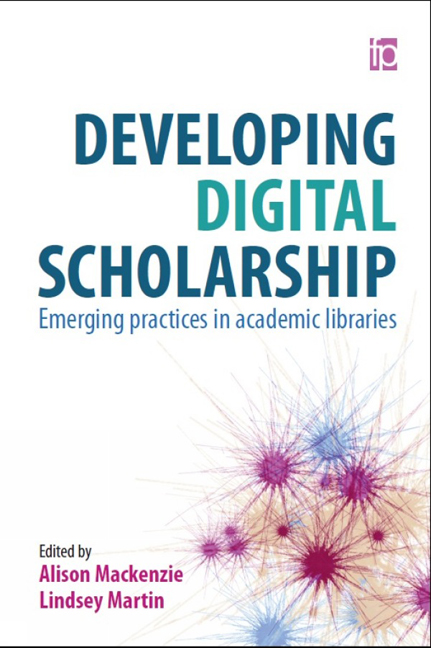Book contents
- Frontmatter
- Contents
- List of figures, tables and case studies
- Editors and contributors
- Introduction
- PART 1 A review of the landscape
- 1 The university library and digital scholarship: a review of the literature
- 2 Digital scholarship: scanning library services and spaces
- PART 2 The agile librarian
- PART 3 Digital spaces and services
- PART 4 Communications and social networking
- Index
1 - The university library and digital scholarship: a review of the literature
from PART 1 - A review of the landscape
Published online by Cambridge University Press: 08 June 2018
- Frontmatter
- Contents
- List of figures, tables and case studies
- Editors and contributors
- Introduction
- PART 1 A review of the landscape
- 1 The university library and digital scholarship: a review of the literature
- 2 Digital scholarship: scanning library services and spaces
- PART 2 The agile librarian
- PART 3 Digital spaces and services
- PART 4 Communications and social networking
- Index
Summary
Introduction
Digital and web-based technologies have impacted on all aspects of daily life to the extent that it is almost becoming unnecessary to prefix terms with the word ‘digital’. In the United Kingdom, the House of Lords Select Committee on Digital Skills concluded that the 21st century is experiencing a revolutionary period, which it calls the ‘second machine age’, driven by advances in digital technology to the extent that
The whole economy has become digitised. It would be a mistake to take the ‘digital sector’ as our sole focus of interest. As digital is pervasive across most aspects of our lives, so the ‘digital economy’ is becoming synonymous with the national economy. Digital skills – the skills needed to interact with digital technologies – are life skills, necessary for most aspects of life.
(Select Committee on Digital Skills, 2015, 20)If digital is now the norm, then this suggests that there should no longer be any real distinction between scholarship and digital scholarship, and yet, according to Jones (2013) and Waters (2013), it is by no means a given that the use of new tools and technologies by scholars automatically results in digital scholarship. What technology does, they argue, is to create ‘affordances’ and ‘possibilities’ for new scholarly practices that scholars can then choose to make use of (Pearce et al., 2010; Weller, 2011; Goodfellow, 2013a; Scanlon, 2014).
The literature on the emergence, practices and impact of digital scholarship at the present time is neither broad nor deep. This review of the literature has revealed that there is little in the way of a shared understanding of what digital scholarship is, that there is a range of terminology and a variety of definitions dependent upon discipline and values, and that there is little that provides an insight into what it might mean to be a digital scholar in practice. Unsurprisingly, then, the role of libraries in responding to the emergence of digital scholarship practices offers a similarly slender literature of differing definitions and approaches to support for and engagement with scholars.
- Type
- Chapter
- Information
- Developing Digital ScholarshipEmerging practices in academic libraries, pp. 3 - 22Publisher: FacetPrint publication year: 2016
- 3
- Cited by



